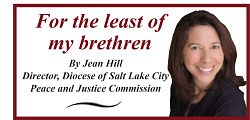Communion Reminds Us of Our Call to Do Justice
Each Sunday when we make our way to Communion, we join the more than one billion Catholics engaged in the same action worldwide, and all those in the past who have done the same for centuries. It is an awe-inspiring thought. As we move down the aisle to receive the gift of Christ’s Body and Blood, millions of our brothers and sisters are making the same journey in every corner of the globe.
Just imagine what all we might accomplish if we similarly partook of Jesus’ ministry to bring peace and justice to the poor, the abandoned, the suffering and the ostracized.
The Bread of Life is fuel for us as we live our covenant with God, a covenant we accepted in our Baptism, to see Christ in everyone and to care for all of God’s creation, especially those who are least able to access its splendors. As we share in the Body and Blood each time we attend Mass, we remember those who live without their daily bread, earthly or divine. But God asks us not just to remember, but to share his love through acts of charity and justice for people in need. The Eucharist is not a reward for good behavior, it is the sustenance we need to go out and live our faith through active engagement with the poor and marginalized in our communities.
The national Eucharistic Revival, which was launched June 19, encourages us to contemplate the great love of God, sacrificing his only Son for our salvation. We also consider the sacrifice he asks of us in return. As Scripture tells us, “What does the Lord require of you but to do justice, and to love kindness, and to walk humbly with your God.” Partaking of the Eucharist is accepting God’s request to do justice, love kindness and walk humbly with him.
“Doing justice” requires action on our part. The Eucharistic celebration amply illuminates our course. Jesus gave fully of himself to others. He saw the image and likeness of God in everyone he encountered, even those who were cast out by society; he offered his life so others could live. Knowing and receiving his love for us encourages us to encounter those cast out by society, to see God in all and to give of ourselves through acts of charity and justice that take us out of our comfortable homes and into the state Capitol or city halls to advocate with people in poverty or who are being denied access to necessities because of discrimination or whose lives are in danger because they are seen as less valuable.
The Eucharist prepares us for the journey ahead. That journey is not one we can spend in our comfy chairs, mindlessly watching talking heads tell us whom they think is to blame for whatever is wrong in the world. Rather, the journey is one that may involve making phone calls or writing emails to our congressional delegation to ensure adequate funding for global and national programs that feed the hungry. It may involve joining a protest to end the death penalty or starting a Walking with Moms in Need program at a parish for moms who struggle in some way to care for their children. Our Eucharistic Revival may call us to serve meals at St. Vincent de Paul Dining Hall, and then meet with our state legislators to demand more permanent supportive housing to care for people who must seek their daily bread from kind strangers at the hall. It may lead us to call on our local cities and parishes to rip out lawns and save desperately needed water for uses that are not merely ornamental.
Participating in Eucharist is an opportunity to remember how deeply God loves us and that we are part of something much bigger than ourselves. We are all brothers and sisters in Christ, equally loved and valued by our Creator, and we have entered a covenant with him to care for one another. As we accept the Body and Blood of Christ, let us also accept the challenge to show our love for each other by doing justice, loving kindness and walking humbly with God.
Jean Hill is director of the Diocese of Salt Lake City Office of Life, Justice and Peace. Reach her at jean.hill@dioslc.org.
© Copyright 2025 The Diocese of Salt Lake City. All rights reserved.


Stay Connected With Us